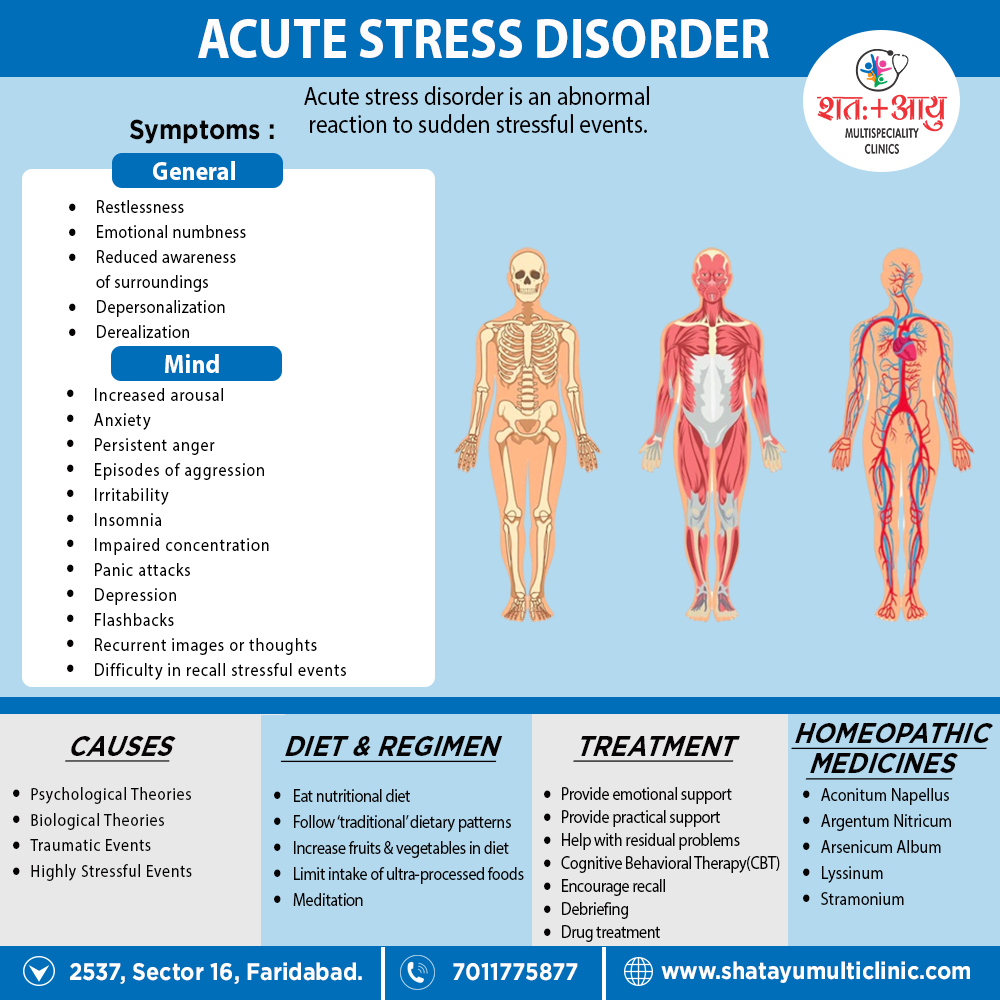Homeopathic Treatment of Acute Stress Disorder
Homeopathy treats the person as a whole. It means that homeopathic treatment focuses on the patient as a person, as well as his pathological condition. The homeopathic medicines selected after a full individualizing examination and case-analysis.
Which includes
- The medical history of the patient,
- Physical and mental constitution,
- Family history,
- Presenting symptoms,
- Underlying pathology,
- Possible causative factors etc.
A miasmatic tendency (predisposition/susceptibility) also often taken into account for the treatment of chronic conditions.
What Homoeopathic doctors do?
A homeopathy doctor tries to treat more than just the presenting symptoms. The focus is usually on what caused the disease condition? Why ‘this patient’ is sick ‘this way’?
The disease diagnosis is important but in homeopathy, the cause of disease not just probed to the level of bacteria and viruses. Other factors like mental, emotional and physical stress that could predispose a person to illness also looked for. Now a days, even modern medicine also considers a large number of diseases as psychosomatic. The correct homeopathy remedy tries to correct this disease predisposition.
The focus is not on curing the disease but to cure the person who is sick, to restore the health. If a disease pathology not very advanced, homeopathy remedies do give a hope for cure but even in incurable cases, the quality of life can greatly improve with homeopathic medicines.
Homeopathic Medicines for Acute Stress Disorder:
The homeopathic remedies (medicines) given below indicate the therapeutic affinity but this is not a complete and definite guide to the homeopathy treatment of this condition. The symptoms listed against each homeopathic remedy may not be directly related to this disease because in homeopathy general symptoms and constitutional indications also taken into account for selecting a remedy, potency and repetition of dose by Homeopathic doctor.
So, here we describe homeopathic medicine only for reference and education purpose. Do not take medicines without consulting registered homeopathic doctor (BHMS or M.D. Homeopath).
1. Arsenicum album:
- This remedy covers a lot of fears and anxieties that lead to obsessive-compulsive behaviors. Your mind can’t stop playing the same trauma over and over again.
- You can only focus on the negative-worrying, perhaps, that something bad will happen either to you or a loved one. In addition, you may overly concerned about germs or your health, to the point of hypochondria.
2. Aconitum napellus:
- Often follows a sudden, unexpected trauma, such as an earthquake or car accident.
- A deep fear of death sends you into a panic state.
- You can feel your heart beating at a rapid pace that comes on all of a sudden.
- You may feel faint, along with perspiration and trembling.
- Things that would not have bothered you before can trigger panic attacks, such as driving on a freeway, getting into an elevator, or flying in an airplane.
- “I went to the supermarket and on the way in the car, I thought I would die,” is the type of statement you might make.
3. Argentum nitricum:
- Very anxious, especially about health.
- I call it “Monkey Brain,” when patients can only focus on their health or lack of it, convinced that every minor ache or ailment is the symptom of a fatal disease, and tend to go from doctor to doctor to get diagnoses.
- Lots of fear- for example heights, crowds, small spaces, etc.
- They have a need to express their feelings in an impulsive way with anyone who will listen.
- They have a feeling of impending doom, such as some evil force is coming for them.
4. Stramonium:
- Night fears and nightmares.
- Fear of the dark, animals, violence, especially when being alone.
- Terrifying nightmares, waking up panic-stricken and full of anxiety. Similarly, anxiety turns into destructive and malicious behavior, an out-of-control feeling, and anger.
- The fears are so deep that they bring on panic.
- Patients can’t stand to be alone. Their reaction to fear is violence.
- They feel they need to protect themselves, so are always on the attack.
5. Lyssinum:
- Hypersensitive to sound, light, smell, also even others’ emotions. Furthermore, their emotions are raw, like exposed nerves.
- They feel they are being torment or ridiculed, also have a dread that something bad will happen to them.
- May have many phobias, such as fear of driving, flying, injury, suffocation.
- May also fear being alone, even though they tend to do better by themselves in a quiet room without much light.
- They have an irrational fear of water, either seeing it or just thinking of it.
- They have bitten by an animal and had fears since then.

